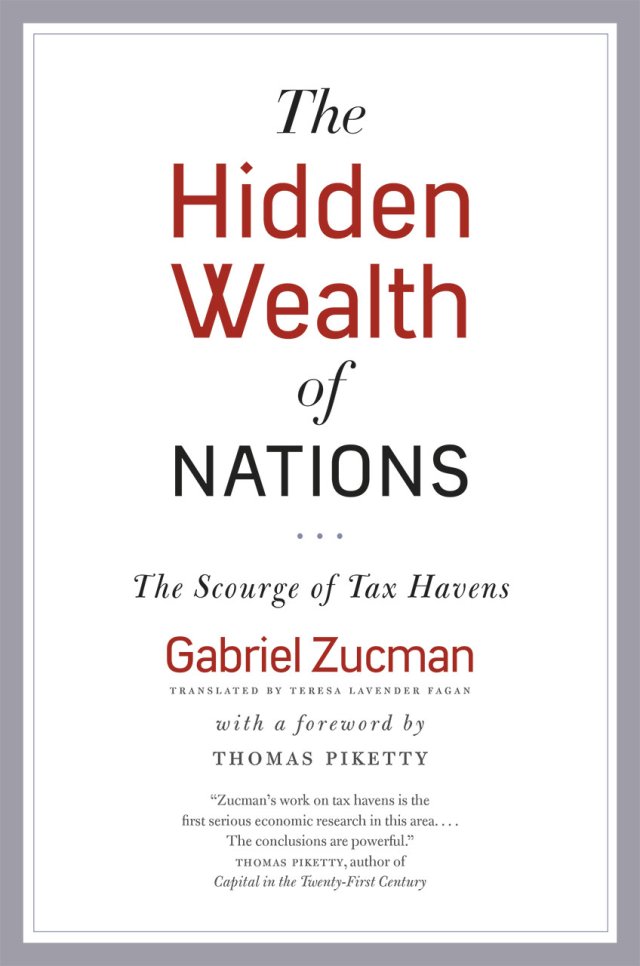
The Hidden Wealth Of Nations: The Scourge Of Tax Havens
Gabriel Zucman
University of Chicago Press
2015, 129 pages
Criminal heists do not come any bigger than the global theft every year by the ultra-rich of about US$200 billion courtesy of the off-shore tax haven banking industry.
The Panama Papers has grabbed headlines, but in The Hidden Wealth of Nations, Gabriel Zucman, economics professor at the London School of Economics and Political Science, also takes a close look at the famous tax-evading practices in Switzerland.
Zucman estimates that a staggering US$7.6 trillion, or 8% of the world's entire individual financial wealth, is held in the tax-shelter banks of Switzerland and a handful of other countries.
There, it annually dodges some $190 billion in interest, dividend and capital gains taxes on the income it generates. It also escapes any wealth and inheritance taxes, which would otherwise be payable in the depositors' home countries should the owners of the hidden wealth — as 80% of them do — choose not to declare these assets to their national tax collector.
Swiss bankers like to claim their 1935 banking secrecy law, which legalised the fabled, anonymous “Swiss numbered bank account”, originated as a noble act to protect the savings of persecuted Jews in Germany. As Zucman shows, however, only 1.5% of non-Swiss depositors who opened accounts between 1933 and 1945 were Nazi victims.
Switzerland's banking “big bang” happened well before Hitler took power, in the 1920s. The biggest growth spurts were fuelled by wealthy French depositors in the years after France raised its top marginal tax rate.
Swiss banks have continued their services for the world's elite who want to cheat on their taxes. Corrupt Russian oligarchs and African dictators are eager clients, but Europe's wealthy lead the crime wave. They account for US$80 billion in tax evaded through offshore tax hidey-holes.
The major method for disguising the true identity of the wealth-owners these days is a devastatingly simple accounting sleight-of-hand. Sixty percent of foreigners' bank accounts in Switzerland confer customer anonymity through de-identified shell companies, trusts or foundations registered in the British Virgin Islands, the Cayman Islands, Liechtenstein, Luxembourg, Bermuda, Jersey and other no-taxing micro-states.
These empty financial fronts can be quickly set up for a few hundred dollars in bank offices in Berne or Zurich.
Many millionaires derive their wealth from their majority shareholdings in multinational corporations (their “ownership of the means of production which leads to true economic and social power”, says Zucman). These companies often engage in the scam of profit-shifting to low or zero tax jurisdictions.
For example, more than half of the total overseas profits made by US multinationals — accounting for 20% of total US corporate profits — takes refuge in tax havens. In doing so, they avoid $130 billion dollars a year in corporate tax that would otherwise be payable at home.
Governments rhapsodising about tax fairness have ritually pledged to deal with tax havens by getting offshore banks to report the identity of their account owners to the relevant national taxation agencies. But weak, simplistic, partial and easily circumvented policies have inevitably followed the rhetorical fanfare.
Procedural failure was built into a G20 scheme in 2009, for example. It trumpeted an “end to banking secrecy”, but impotently oversaw a 25% rise in the wealth hidden in tax havens.
New arrangements proclaimed by the G20 (now headed by the Australian government) have obtained pledges by most tax havens to cooperate from 2017-18. Yet defeat looks guaranteed here, too, because nowhere does the new protocol deal with the identity-covering “opacity of financial intermediation chains” of shell corporations. Nor are there verification procedures or penalties for failure to comply.
Zucman proposes more radical measures. A global financial register of tax haven accounts, run by the International Monetary Fund, would identify (and therefore make taxable) which of the tax haven foreign clients own exactly what wealth. This would be backed by economic sanctions such as customs duties and tariffs on non-cooperating banks.
Profit-shifting by multinationals would also be stymied by a sales-based formula that apportions global consolidated profits on the basis of the country where each corporation does actual business rather than the low-taxing country where it is formally headquartered.
Zucman desperately wants to tame the power of money, unlike governments which — he notes with considerable understatement — “have not been stellar in their boldness or determination” to tackle tax haven theft. Zucman does not ask why this is so, however.
Millionaires and corporations — including the tax-haven banks which profit massively from wealth management fees — do not want to pay their fair share of tax because this would cut into their wealth and profits.
Almost all the agreeable politicians are in the pockets of their corporate donors — or, like Australian Prime Minister Malcolm Turnbull, are tax-sheltering multi-millionaires themselves. These politicians share the political ideology of profit maximisation for whom a genuine assault on tax havens is anti-capitalist heresy and therefore inconceivable.
The tax-defrauding capitalist class needs to be politically challenged by the working-class taxpayers they frequently steal from. Do not expect the world's capitalist governments to be leading that fight.
Like the article? Subscribe to Green Left now! You can also like us on Facebook and follow us on Twitter.